

The problem of 'Passion' in teaching. Why the racist history of the charter school movement is never discussed. By Christopher Bonastia, AlterNet As a parent I find it easy to understand the appeal of charter schools, especially for parents and students who feel that traditional public schools have failed them.

As a historical sociologist who studies race and politics, however, I am disturbed both by the significant challenges that plague the contemporary charter school movement, and by the ugly history of segregationist tactics that link past educational practices to the troubling present. The now-popular idea of offering public education dollars to private entrepreneurs has historical roots in white resistance to school desegregation after Brown v. Board of Education (1954). The desired outcome was few or, better yet, no black students in white schools. Two years before a federal court set a final desegregation deadline for fall 1959, local newspaper publisher J. This points to a larger historical issue. The market is not a self-regulating mechanism: players need rules to guide their behavior.
Work, Study and Scholarship as an Academic Parent, Part I: Grad School Babies « judgmental observer. The Puns and Detritus in James Joyce’s “Ulysses” On a day in May, 1922, in Paris, a medical student named Pierre Mérigot de Treigny was asked by his teacher, Dr.
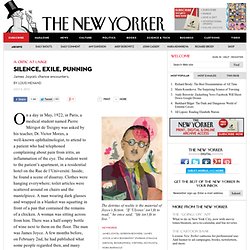
Victor Morax, a well-known ophthalmologist, to attend to a patient who had telephoned complaining about pain from iritis, an inflammation of the eye. The student went to the patient’s apartment, in a residential hotel on the Rue de l’Université. Inside, he found a scene of disarray. Steven Pinker on the false fronts in the language wars. Nature or nurture.

Love it or leave it. If it doesn’t fit, you must acquit. If you didn’t already know that euphonious dichotomies are usually phony dichotomies, you need only check out the latest round in the supposed clash between “prescriptivist” and “descriptivist” theories of language. Paul Fussell: Remembering the author of The Great War and Modern Memory. Photo courtesy of U.S.
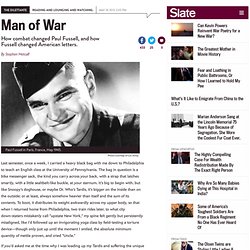
Army. Last semester, once a week, I carried a heavy black bag with me down to Philadelphia to teach an English class at the University of Pennsylvania. Lincoln High School in Walla Walla, WA, tries new approach to school discipline — suspensions drop 85% « ACEs Too High. Has Physics Made Philosophy and Religion Obsolete? - Ross Andersen - Technology. "I think at some point you need to provoke people.
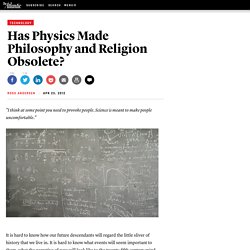
Science is meant to make people uncomfortable. " It is hard to know how our future descendants will regard the little sliver of history that we live in. It is hard to know what events will seem important to them, what the narrative of now will look like to the twenty-fifth century mind. We tend to think of our time as one uniquely shaped by the advance of technology, but more and more I suspect that this will be remembered as an age of cosmology---as the moment when the human mind first internalized the cosmos that gave rise to it.
Over the past century, since the discovery that our universe is expanding, science has quietly begun to sketch the structure of the entire cosmos, extending its explanatory powers across a hundred billion galaxies, to the dawn of space and time itself. The Mystery of the Millionaire Metaphysician: Slate republishes one of the greatest magazine stories ever written. Marie-Lan Nguyen via Wikipedia.
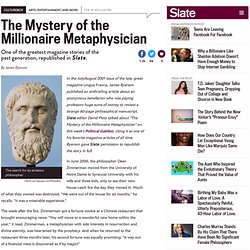
In the July/August 2001 issue of the late, great magazine Lingua Franca, James Ryerson published an enthralling article about an anonymous benefactor who was paying professors huge sums of money to review a strange 60-page philosophical manuscript. Slate editor David Plotz talked about “The Mystery of the Millionaire Metaphysician” on this week’s Political Gabfest, citing it as one of his favorite magazine articles of all time. Ryerson gave Slate permission to republish the story in full. In June 2000, the philosopher Dean Zimmerman moved from the University of Notre Dame to Syracuse University with his wife and three kids, only to see their new house catch fire the day they moved in. Bottom line shows humanities really do make money / UCLA Today. Mar 23, 2010 By Robert N.
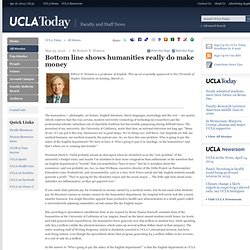
Watson Robert N. Watson is a professor of English. This op-ed originally appeared in the Chronicle of Higher Education on Sunday, March 21. The humanities — philosophy, art history, English literature, Slavic languages, musicology and the rest — are quaint, elderly relatives that the real, serious, modern university (consisting of technological researchers and the professional schools) subsidizes out of charitable tradition but has trouble pampering during difficult times. President Mark G. If you count what patients pay for treatment as income earned by a medical center, but do not count what students pay for literature courses as income earned by the humanities department, the hospital will surely look like a much smarter business.
David Orr's Beautiful & Pointless: How do you read a poem? - By Craig Morgan Teicher. Guidebooks, especially guidebooks to poetry, make me nervous.
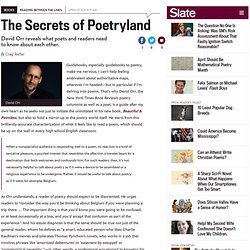
I can't help feeling ambivalent about authoritative maps, wherever I'm headed—but in particular if I'm delving into poems. That's why David Orr, the New York Times Book Review's poetry columnist as well as a poet, is a guide after my own heart as he seeks not just to initiate the uninitiated in his new book, Beautiful & Pointless, but also to hold a mirror up to the poetry world itself. He starts from this brilliantly accurate characterization of what it feels like to read a poem, which should be up on the wall in every high school English classroom:
What teachers really want to tell parents. Teacher Ron Clark is pictured with his students.
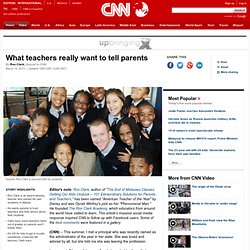
Ron Clark is an award-winning teacher who started his own academy in AtlantaHe wants parents to trust teachers and their advice about their students Clark says some teachers hand out A grades so parents won't bother themIt's OK for kids to get in trouble sometimes; it teaches life lessons, Clark says Editor's note: Ron Clark, author of "The End of Molasses Classes: Getting Our Kids Unstuck -- 101 Extraordinary Solutions for Parents and Teachers," has been named "American Teacher of the Year" by Disney and was Oprah Winfrey's pick as her "Phenomenal Man. " He founded The Ron Clark Academy, which educators from around the world have visited to learn. This article's massive social media response inspired CNN to follow up with Facebook users.
7. Ways To Kill Creativity. Promoting Thriving in School-Aged Children: A Checklist. It's important for adults to remember what children are designed to be doing during childhood--challenging social play outdoors in the rhythms of nature .
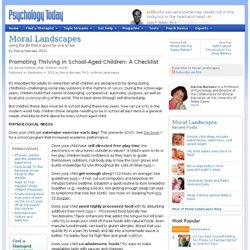
During the school-age years, children build their sense of belonging, competence, autonomy, purpose, as well as trust and understanding of the world. This is best done through self-directed play. But children these days must be in school during these key years. How can parents in the modern world help children thrive despite needing to be in school all day? Here is a general needs checklist to think about for every school aged child. Does your child get ? Does Language Shape What We Think? My seventh-grade English teacher exhorted us to study vocabulary with the following: "We think in words. The more words you know, the more thoughts you can have. " This compound notion that language allows you to have ideas otherwise un-haveable, and that by extension people who own different words live in different conceptual worlds -- called "Whorfianism" after its academic evangelist, Benjamin Lee Whorf -- is so pervasive in modern thought as to be unremarkable.
Eskimos, as is commonly reported, have myriads of words for snow, affecting how they perceive frozen percipitation. A popular book on English notes that, unlike English, "French and German can distinguish between knowledge that results from recognition ... and knowledge that results from understanding. " Politicians try to win the rhetorical battle ("pro-life" vs. A-Flowchart-to-Help-You-Determine-if-Yoursquore-Having-a-Rational-Discussion.jpg (622×866) Goodbye, Oxford comma? Hello, Shatner comma! The Resume Is Dead, The Bio Is King. If you’re a designer, entrepreneur, or creative – you probably haven’t been asked for your resume in a long time. Instead, people Google you – and quickly assess your talents based on your website, portfolio, and social media profiles.